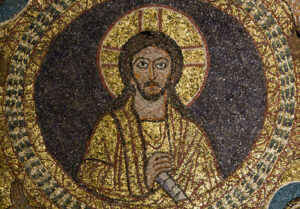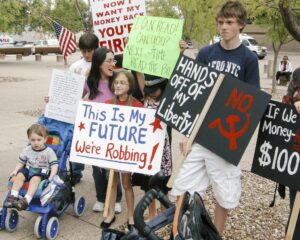Every year, as the Christmas season rolls around, progressive Christians rush to remind the world that the real meaning of the Christmas story is not about excessive consumption, guns under the Christmas tree, or racking up debt to buy presents for your kids. The real meaning of Christmas is radical: Jesus wasn’t a white baby in need of strong borders to preserve his future but a Middle Eastern immigrant. Mary wasn’t a suburban mom but a fists-raised revolutionary calling for the mighty to be laid low and the humble raised up. The gospel was first announced not to the wealthy but to the shepherds on the hillside, marginalized workers, and the wise men who were travelers from despised pagan lands.
Of course, as we’re also reminded every year, Christmas as we know it was a Victorian invention. The secular equivalent of the rush to reclaim Christmas for the left comes in the reminders that the other Christmas story, Charles Dicken’s A Christmas Carol, is actually a feel-good parable about the importance of terrorizing bosses until they agree to pay their workers. But there is a problem that haunts all attempts to articulate a radical vision of Christianity or Christmas: if the real meaning of the birth of Jesus is the overturning of hierarchies, the re-ordering of the world around the marginalized and excluded, and the putting right of all that is wrong with the world, how has Christmas come to be so central to a culture built on the violent, hierarchical divisions of capitalism?
Gratifying as it is to claim that the real meaning of Christmas is the one we already agree with, like all quests for the historical Jesus, it seems that what we find when we follow the star to Bethlehem, or take a ghostly tour through the spirits of Christmas past, present and future, is an affirmation of what we already knew. Perhaps the most persistent theme in both Christian and secular renditions of the Christmas story is precisely the desire to rediscover the true meaning of Christmas – whether that’s fairly paying your workers, falling in love, making sacrifices to give your kids the perfect day, or realizing that family and friendship matter more than career ambitions or the pursuit of wealth.
Above all, Christmas is a time for families, and whatever we might want to assert about the theological significance of Christmas, in practice most of us spend the season navigating – more or less successfully – the complexities of the familial relationships we find ourselves with or without. As a holiday organized around the home, children, and the giving of gifts, Christmas is in practice a festival of social reproduction, of all the invisible work that goes into making and maintaining families, raising children, and passing on spiritual and moral values. Capitalist societies have historically been distinguished by their separation of the work of production and social reproduction. Production has to do with making things to be sold for profit, usually for a wage, and is typically done by men. The work of social reproduction involves housework, childcare, education, and all of the other labor that creates and sustains productive workers – usually unpaid and typically done by women. Christmas is a holiday, but it doesn’t always feel like one for those tasked with the work of decorating, cooking, shopping, wrapping, stuffing stockings, and maintaining the peace at family gatherings. Like all forms of social reproduction, it might feel like a magical space of respite from work and exploitation. But this fantasy both covers over the real work that goes into making it happen and distracts us from the fact that the magic of Christmas is meant to restore us just enough to send us back to the grind come the new year.
The queer theorist Lee Edelman has argued that the truly radical figure in A Christmas Carol is Ebeneezer Scrooge before he’s browbeaten by ghosts into the spirit of Christmas. The real problem Dickens has with Scrooge, Edelman suggests, is not that he’s a boss but that he’s a bachelor. Not only does he refuse to get married and to have his own children, he rejects the friendly invitation of his nephew Fred to celebrate Christmas with him. Worst of all, by refusing to give Bob Cratchit a raise, he endangers the life of the innocent Tiny Tim. It’s not an accident, Edelman suggests, that Scrooge is queer coded (having rejected marriage in favor of a partnership with Jacob Marley) not because Edelman thinks that Scrooge is meant to be gay, but because he represents the threat to the future of the family, to reproduction. Won’t somebody think of the children? Indeed, a recurring theme of the newly emergent genre of gay Christmas films has been their emphasis on the incorporation of queer people into the true meaning of Christmas: helping stiff patriarchs get in touch with their feelings and reconcile with their family (2020’s Happiest Season); or falling in love, just like straight people (2021’s Single All the Way). The family can be reshaped to incorporate new forms of domestic relationship but it cannot, according to the spirit of Christmas, be abolished.
This emphasis on love, family, and the Christmas spirit might seem to be at odds with the demands of capitalism and is often presented as such. Like Scrooge, the protagonists of Christmas films often need to learn that there’s more to life than money, work, and ambition. It’s tempting to see here, in both Christmas and the haven of the family, the potential for a radical politics. But as Melinda Cooper argues in her book, Family Values: Between Neoliberalism and the New Social Conservatism, the desire to rescue the family from the ravages of capitalism isn’t a way out of the logic of the market, but is itself a deeply capitalist desire, part of a “double movement” that is internal to capitalism. On the one hand, capitalism tends to destroy all social bonds in order to extract more profit; but on the other hand, it seeks to reinvent those same social bonds in order to stabilize itself and perpetuate the inequalities of wealth and income that it relies on. Capitalism both undermines the family and the moral and spiritual values which hold it together, and relies on it to continually reproduce distinctions of gender, race, and class. In the family we encounter both the most powerful consolations that capitalism offers us – love, care, generosity – and its primordial violence – hierarchy, exclusion, extraction.
Where does Christianity come into this? As the world was divided into the masculine public sphere of production and the feminine private sphere of reproduction, Christianity found itself largely assigned to the private sphere of home and family, women and children, tasked with instilling moral values and with spiritually refueling those worn down by the brutalities of public life . The Jewish scholar Gershom Scholem suggested that, where for Judaism the coming of the Messiah has always been a public, political and outward event, from Augustine onwards Christian messianism has tended to focus on private, spiritual, and inward transformations. But a focus on inwardness doesn’t just distract from political questions, it can – and often has – actively worked to uphold the existing order of things. Life might be hard, work exploitative, the world unjust. But the Christmas season does not disrupt the endless cycle of violence and dispossession so much as it allows us – or at least some of us – to catch our breaths in the middle of it, to rest, and to return to the world more able to bear it. Scrooge comes to repent of his rejection of Christmas, to become a more cheerful and generous boss; but he is still a boss, nonetheless.
Christmas is about home and family, and just as home and family are where we first learn what kind of people we are meant to be and how we are meant to relate to the distinctions of gender, race, and class into which we have been born, the Christmas story is how we tell ourselves, as families and as a society who we are and what matters. At Christmas we encounter both the violence and the seduction of family, home, and morality – the longing to be with people who love us and the misery of being separated by borders, by work, or by unaffordable travel costs. We enjoy the love of the people we made and who made us and suffer the pain of alienation, rejection, and abuse. In Christmas, we confront the foundational violence of the world we inhabit: the distinction between Christian and non-Christian which gave rise to divisions of race and nation; the logics of family and inheritance which reproduce the distinction between rich and poor; the gendered care and violence of family, friendships and community. At Christmas, we confront our struggles with and against both home and family.
If the birth of a baby represents the possibility of new life breaking into the world, then it also represents the weight of tradition, of inheritance, of repetition. So much of what can be read as radical in the gospel stories emerged from a context in which Christianity was a marginal sect of a colonized people. The story of Jesus’ birth as we have it in the gospels draws deliberately on tropes taken from contemporary narratives of the births of Roman emperors. It was an attempt to retell the foundational narrative of the birth of an empire in opposition to that empire, and while it laid the foundation for Christian opposition to the powers that be it has just as often been used as an affirmation of those powers. The journey that Mary and Joseph made back to their ancestral home was undertaken at the command of an imperial power. Christianity became that power; the drone-bombing of innocents is done in our name. If we don’t understand how that happened, and how that inheritance continues to shape us, then we will continue to repeat it.
Marika Rose is Senior Lecturer in Philosophical Theology at the University of Winchester. She is the author of A Theology of Failure: Zizek Against Christian Innocence.




